'Where is their soul?': Inside the failed push to make Catholic Church pay for its residential school abuses

Residential school survivor Rick Daniels and his wife, Judy Greyeyes, live in a small apartment just a few kilometres from Saskatoon's towering $28.5-million Holy Family Cathedral.
The cathedral features solar-powered stained glass windows, a carved granite altar, seating for 2,000 people and a steel cross that sits 53 metres above ground, dominating the suburban Prairie skyline. The church opened in 2012 following a massive, multi-year fundraising campaign.
But while all this was happening, critics say another financial commitment was largely forgotten.
Catholic churches in Saskatoon and across Canada had also signed an agreement promising to raise $25 million to compensate Daniels and tens of thousands of other survivors for the emotional, physical and sexual abuse, malnutrition, cultural shaming and systemic violations of basic human rights suffered in Catholic-run residential schools.
"They were told to take the Indian out of the child at all costs, and they took it literally," said Daniels, 73, a member of Mistawasis Nehiyawak who attended St. Michael's Indian Residential School north of Saskatoon.
The $25 million — part of the sweeping Indian Residential School Survivor Agreement (IRSSA) — was supposed to help survivors, and also provide counselling and support for their families.
But most of that money was never raised.
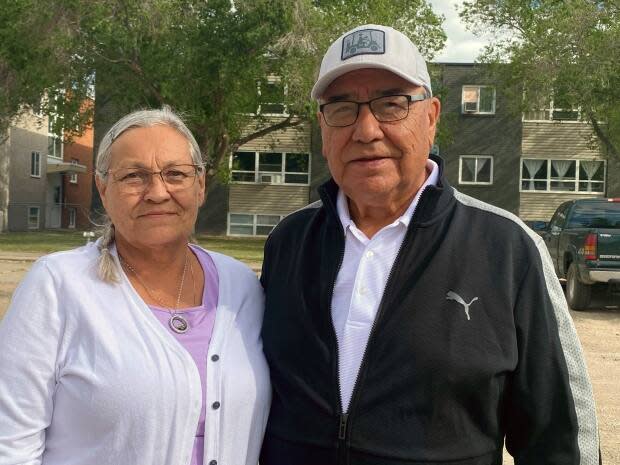
While the Roman Catholic Diocese of Saskatoon and its 80,000 members spent $28.5 million on the new cathedral, they raised just $34,650 for survivors.
The story was similar in other cities. Canada's 12 million Catholics donated less than $4 million of the promised $25 million — roughly 30 cents per person.
After several years, the federal government told the Catholic Church to pay up.
Instead, church officials hired one of Canada's top lawyers, who, in a private court hearing, successfully argued that the country's Catholic churches had tried their best and had no more to give.
Daniels doesn't believe them. "I'm not too keen on their lack of willingness to help people. I guess they were thinking about that building instead," he said.
Daniels's wife said if local parishioners and churches won't help survivors, the Vatican should pay.
"The Roman Catholic Church is filthy rich but they're hesitant to do the right thing," Greyeyes said. "It's not for us. Help the future generations who are paying the price."
Daniels and Greyeyes are not alone in their frustration.
CBC News has interviewed more than a dozen people with knowledge of the controversial $25-million deal, as well as the years of closed-door legal and political manoeuvring that followed. Some are speaking publicly about these events for the first time.
They're hoping the recent combined preliminary discoveries of nearly 1,000 unmarked graves at Catholic-run residential school sites in Kamloops, B.C., and the Cowessess First Nation in Saskatchewan will spur the church to finally do the right thing.
"They should go back. They should raise the money, and then some. There is a spiritual and moral deficit here," said Mary Ellen Turpel-Lafond, a former Saskatchewan provincial court judge and current director of the University of British Columbia's Indian Residential School History and Dialogue Centre.
"You can't always fix a mistake, but now is the time to try."
'Things are shaky in Ottawa'
Peter Grant said he'll never forget the afternoon of Friday, Nov. 18, 2005. Grant and 60 fellow lawyers sat in a Toronto conference room negotiating terms of the landmark IRSSA.
Prime Minister Paul Martin had repeatedly called it one of his top priorities, appointing retired Supreme Court Justice Frank Iacobucci to represent Canada at the talks and giving everyone one year to finalize the agreement.
They had five months to go. Grant said most were optimistic a deal could be reached by then.
But that afternoon, an official walked in and told them, "We've all got to work over the weekend. Things are shaky in Ottawa."
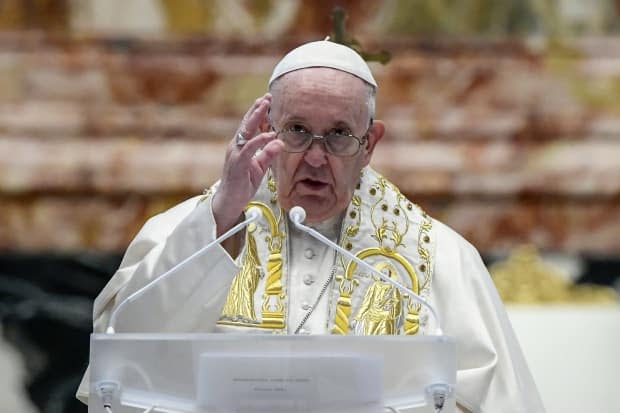
The growing rumours of a non-confidence motion against Martin's minority government had proven true. Opposition leader Stephen Harper was about to force a vote.
The lawyers needed a signed deal before the government fell. Grant cancelled his flight home to Vancouver.
The group worked almost non-stop. By Sunday evening, the main agreement was complete. They'd finalized plans for the historic Truth and Reconciliation Commission, for the Aboriginal Healing Fund, for residential school commemoration and for financial compensation.
"We were well aware of the political machinations in Ottawa. We pushed on as hard as we could for the survivors," said former Assembly of First Nations (AFN) Chief Phil Fontaine.
"It was not a perfect agreement, but I was proud of it. There was a lot there."
The government, the AFN, Inuit representatives and survivors' groups were all ready to sign, as were the Anglican, United and Presbyterian Churches. One holdout remained: the Catholic Church.
In previous years, the Catholic Church was the only church refusing to pay its 30 per cent share of survivors' claims. Now, its lawyers were also refusing to sign this deal.
Grant said there was immense pressure on everyone. "We were running out of time. We had to get past it," he said.
The government and Catholic lawyers went behind closed doors to hammer out a side deal. Catholic officials knew the pressure Martin was facing, and were also enraged over his government's recent legalization of same-sex marriage, said former Liberal MP and Prince Albert Grand Council Chief Gary Merasty.
"The Catholic Church was absolutely reluctant to take any responsibility. It was hard to pin them down," Merasty said.
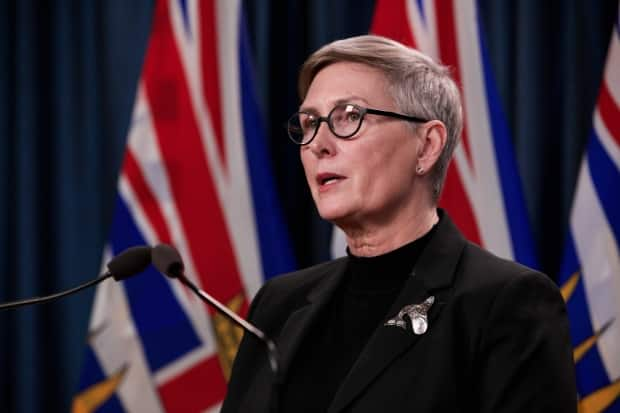
The two sides eventually emerged and said the government would be responsible for collecting a negotiated amount directly from the church. Everyone agreed.
On Sunday, just before midnight, federal officials flew back to Ottawa with a copy of the agreement, Grant said. On Wednesday, following cabinet approval, Martin announced the deal. His government fell four days later.
But the Indian Residential Schools Settlement Agreement — the largest class-action settlement in Canadian history — could not be cancelled by the incoming Harper regime.
Best efforts
The IRSSA was long and complex, so two words inserted into that Catholic side deal got little attention back in 2005. But those two words — "best efforts" — are at the heart of a multimillion-dollar question.
In the 78-page side deal, the Catholic Church first agreed to make a lump $29-million cash payment and $25 million of "in kind services" to survivors, such as counselling.
Today, Turpel-Lafond and others ask why the perpetrator was allowed to provide in-kind services to the victims.
Then, in Section 3.9 of Schedule O-3, there was one more promise: Catholic churches across the country promised to come up with another $25 million.
They legally agreed to a cross-Canada effort "consistent with the approach and means used by professionally managed national fundraising campaigns, including those operated by universities and hospital foundations."
The church was required to prove it gave its "best efforts."
When Grant saw the wording, he shook his head.
"Best efforts? That's useless. It's a big escape clause," he said.
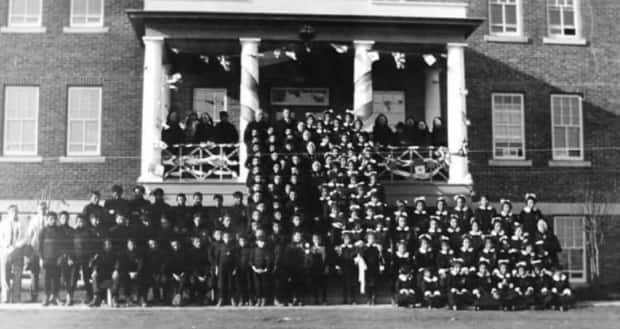
Few doubted the church's ability to pay. After all, Catholics would soon raise $28.5 million for a new cathedral in Saskatoon alone. Many believed the Vatican could chip in if necessary.
The Catholic Church's global total wealth is not publicly available, but officials released limited statements last year revealing $6 billion in Vatican Bank holdings. The church is the largest non-governmental landowner in the world, according to the University of Notre Dame's Fitzgerald Institute for Real Estate. Its holdings total roughly 177 million acres, an area slightly larger than the province of Saskatchewan.
Even many critics believed Canadian church officials would quickly raise the $25 million, because the legal and financial exposure was immense. Tens of thousands of damaged survivors and their lawyers had been poised to devastate government and church finances before the IRSSA was reached.
Looking south, abuser priest scandals were bankrupting churches across the U.S. One diocese in Minnesota was forced to pay 450 victims a total of $210 million.
The buyout
Seven years passed. By early 2013, the other church denominations — United, Anglican, Presbyterian — had long since paid their share. But less than $4 million had been raised nationally by the Catholic churches.
AFN Chief Fontaine, a survivor himself, even tried to help the church raise money. Churches in some major cities, like Calgary and Toronto, donated little or nothing toward the $25-million goal, he said. The churches also hadn't paid the full initial instalment of $29 million.
The federal government said it was time to pay.
Though it already had its own team of experienced lawyers, to deal with this situation, the Catholic Church turned to Gordon J. Kuski.
The Regina lawyer has won international acclaim defending class-action clients such as Monsanto, Telus and Pfizer, according to his firm's website. He's represented Saskatchewan judges in their last six salary negotiations.
Kuski and a federal lawyer began exchanging emails. The Catholic Church proposed a buyout.
When it became clear the churches were offering only $1.2 million more — far short of their stated commitment — the federal lawyer used phrases such as: "We may have a problem," and, "We have no agreement on the terms of the settlement."
After months of correspondence, there was still no written or verbal agreement.
Despite this, Kuski and the church said that didn't matter. They took the position a deal had actually been struck because of the expectations created in the emails.
The matter went to court.
On July 16, 2015, after a secret hearing the previous month, Justice Neil Gabrielson sided with the Catholic Church, saying the federal lawyer wasn't clear enough in his opposition to the proposal and a "reasonable person" would conclude a deal had been struck.
The Catholic churches quickly paid the $1.2 million buyout. They were still more than $21 million short of their commitment, but were absolved of any further legal or financial obligations.
The federal government, now led by Harper, chose not to appeal.

'A legal back door'
Turpel-Lafond studied the case closely once the results were made public. She said the church betrayed survivors by using high-priced lawyers.
"They manipulated the legal system to their advantage. They found a legal back door. I know how that works out when it comes to issues for Indigenous people in Saskatchewan, and in Canada," said Turpel-Lafond, a member of the Muskeg Lake Cree Nation north of Saskatoon.
The entire case is "an embarrassment to the legal profession in Saskatchewan," said Turpel-Lafond, and should be reviewed by the province's attorney general.
University of Calgary law professor Kathleen Mahoney, who helped craft the IRSSA while working for the AFN, also said she was disgusted.
"They relied on these highly technical arguments. It may have worked, but it's not very honourable. It's not moral. It's not ethical," Mahoney said.
Mahoney said it's ludicrous for the Catholic churches to claim they couldn't find the money.
Catholic Church leaders use the same techniques as other multinational corporations, she said: They decentralize and complicate the legal structure to avoid liability at the higher levels.
"The fact of the matter is the Vatican's wealth is immeasurable: paintings, statues, land, huge buildings all over the world," Mahoney said.
"It does nothing for reconciliation, nothing for survivors when your position is essentially, 'We won, we won!' and wave a legal decision around. Where is the soul of the church? Where is their soul?"
WATCH | Mary Ellen Turpel-Lafond says Canada let Catholic Church 'off the hook' for compensation deal:
'Certainly not pro-bono'
In an interview with CBC News this month, Kuski said a signed contract is not always necessary. Verbal or email exchanges can be binding, and the amount of money is irrelevant.
Kuski said he was instructed to tell the judge "best efforts" had been given by every church when it came to the fundraising.
"The fundraising efforts didn't bear much fruit," Kuski said. "[But] they said, 'Look, we did our best. This is all we could come up with.' That was their position and it was accepted."
Kuski declined to say how much the churches paid for his services, but did say he charged his full hourly rate during the lengthy process.
"It took some time to work through everything," Kuski said. "It was certainly not pro-bono."
Another veteran Regina lawyer, James S. Ehmann, has worked for decades for the Catholic churches on this case and other residential school files.
"The 'best efforts' language was not put forward to facilitate reneging on any obligations," Ehmann said in an interview.
"The status of the Martin government and the timing of an election had absolutely nothing to do with the settlement or the wording of the [initial] settlement, from my point of view.
"It has been my experience that Catholic entities were co-operative and compassionate, and continue to be so."
CBC News asked several other Catholic officials whether they still believe they gave "best efforts." None answered the question directly.
The Diocese of Saskatoon came closest. Bishop Mark Hagemoen declined several interview requests, but in an emailed statement, admitted the fundraising campaign for the $28.5-million cathedral "was indeed a major effort," while fundraising efforts for the thousands of residential school survivors was "weak."
Growing anger
Anger toward the Catholic Church has been growing since the Kamloops revelation. Since the Cowessess discovery was announced last week, several B.C. churches have been burned. Protests and boycotts are being organized across Canada.
Saskatoon's older downtown cathedral — the city now has two functioning cathedrals — was marked with red paint, including small handprints and three words: "We Were Children."
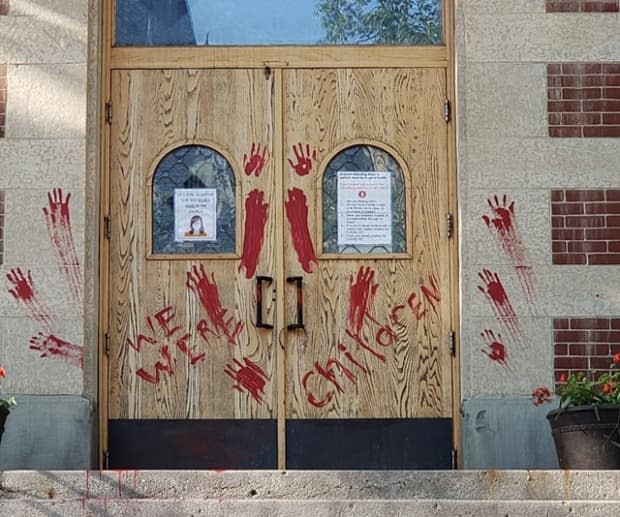
Mahoney, Merasty and others said there are other issues fuelling the anger: the failure of the Catholic Church to disclose all records from the schools, the refusal of Pope Francis to come to Canada and apologize, and fears that many more graves remain undiscovered. Most of all, there is a feeling that the Catholic Church is again failing to take responsibility.
As a starting point — and a show of good faith to survivors like Rick Daniels — the Catholic Church must pay the full $25 million outlined in the settlement, they say.
"The Catholic Church is fantastically wealthy," said Merasty, who toured the Vatican with his family several years ago. "There is a moral obligation here."
'A lot of other people need help'
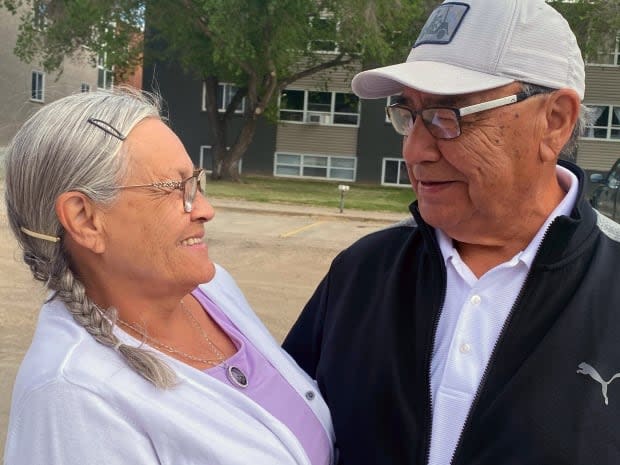
Daniels still has nightmares of his time at St. Michael's. He feels anxious if someone approaches him from behind. He has to turn his head when listening, the result of repeated blows to his right ear.
But Daniels said he's no longer "full of anger and hate." He and his wife work as cultural advisers across Saskatoon, sometimes in the shadow of the new cathedral, teaching young people how to take back their stolen identity.
If the Catholic Church decides to pay, Daniels and Greyeyes say it should go to this new generation, funding things like family counselling and language programs — even bus passes or child care.
"I don't know what we'd do with it. We aren't fancy travellers or anything," Greyeyes said. "But a lot of other people need help."
Support is available for anyone affected by their experience at residential schools, and those who are triggered by the latest reports.
A national Indian Residential School Crisis Line has been set up to provide support for former students and those affected. People can access emotional and crisis referral services by calling the 24-hour national crisis line: 1-866-925-4419.

